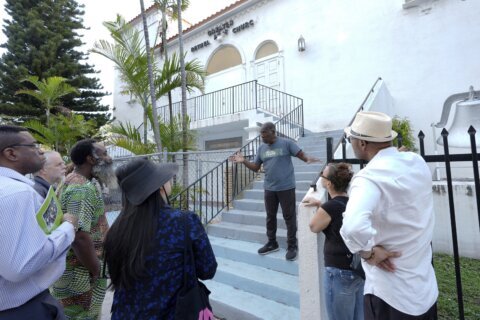KASAMA, Zambia (AP) — Every morning, Bridget Chanda places her prosthetic legs beside her bed, pulls on her stockings and pushes the remains of her limbs into the prosthetics as best she can. After six years they no longer fit, and it’s painful to stand or walk for too long, but it doesn’t faze her much.
“I still manage somehow,” she said. “I am a girl on a mission.”
Chanda, 18, is intent on helping educate Zambia’s deaf community about climate change. As the southern African nation has suffered from more frequent extreme weather, including its current severe drought, it’s prompted the Zambian government to include more climate change education in its school curriculum.
But for that to be shared with the deaf community, it’s up to people like Chanda to help translate — and it’s a task that is more difficult because sign language doesn’t include many climate-related terms.
She’s a student at Chileshe Chepela Special School in Kasama, in northern Zambia, where many students are deaf or hard of hearing. After Chanda enrolled there in 2022, learning sign language was a way to fit in and bond with those schoolmates, even though she herself is not deaf. Around the same time, climate change was becoming a more topical issue in the country, and Chanda — who finds it puzzling that her hometown in the south near Lusaka has been wracked by drought while Kasama is looking at a bumper harvest — wanted to talk about it.
“Climate change affects our way of life,” she said.
The country has been suffering from severe food shortages as water has grown scarce, prompting the president to declare a national emergency in February.
Chanda has served as an interpreter as climate agriculture expert Elizabeth Motale visits communities and schools to educate people on climate change. In one visit to a garden outside Chanda’s school, she signed as Motale showed students how drip irrigation gets precious water exactly where plants need it. Students smiled and laughed as they perforated a plastic bottle to dribble water onto the plants’ roots.
Chanda has even taught Motale some sign language to use when no interpreter is available.
“Bridget has been such a blessing to me,” Motale said.
Sign language isn’t recognized as an official language in Zambia, but the government has taken steps to ensure its recognition and has made it mandatory for climate change education to also be taught in sign language. But with the language lagging behind, it can be a challenge to teach new concepts.
Chanda recalls struggling to find the words to explain mulching, for example — adding organic material to soil to help trap moisture — or climate adaptation, the ways people can adjust to more extreme weather.
“It’s difficult sometimes,” said Chanda. “I sometimes have to finger-spell and when I miss a letter or two it makes it difficult for some students who are deaf.”
The Campaign for Female Education (CAMFED), a pan-African movement promoting girls’ education, launched a new climate education program in schools in March, led by young women graduates. The program, in partnership with education ministries in Zambia and Zimbabwe, aims to help young people — particularly marginalized girls — build climate resilience and explore green careers.
Part of the climate education CAMFED wants to promote is practical. It runs an agriculture guide program that aims to promote climate-smart techniques, like drip irrigation that uses less water, and teaches entrepreneurship skills that may help young women launch farming businesses that use such skills.
Helena Chandwe, an enterprise manager with CAMFED, said it’s important to improve how the information is delivered to students with special needs, and that means interpreters who can deliver it correctly and with sufficient context.
Chanda hopes to join the agriculture guides program after finishing her education.
Her lower legs were amputated after she developed gangrene at age 7. Stigmatized and bullied at school in Lusaka, she eventually wound up at Chileshe, where she has found a far more welcoming environment in a place that mixes special-needs students with mainstream students.
Her prosthetic limbs don’t keep her from wheeling a friend, Juliet Nankamba, around in Juliet’s wheelchair. The two often sit next to each other in class, sharing books and taking part in class discussions and assignments. Asked about her friendship with Bridget, Juliet smiles, laughs and flashes a peace sign.
Chanda struggles to hold back tears as she describes how CAMFED has helped with her tuition and boarding fees. She was appointed head girl at the beginning of the year, and said she dreams of one day becoming an orthopedic surgeon, going far away from Zambia to make her mother proud.
___
The Associated Press’ climate and environmental coverage receives financial support from multiple private foundations. AP is solely responsible for all content. Find AP’s standards for working with philanthropies, a list of supporters and funded coverage areas at AP.org.
Copyright © 2024 The Associated Press. All rights reserved. This material may not be published, broadcast, written or redistributed.






